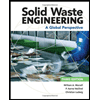1. What is the problem here? 2. What is the moral dilemma? 3. What values are applicable here?
1. What is the problem here? 2. What is the moral dilemma? 3. What values are applicable here?
Solid Waste Engineering
3rd Edition
ISBN:9781305635203
Author:Worrell, William A.
Publisher:Worrell, William A.
Chapter2: Municipal Solid Waste Characteristics And Quantities
Section: Chapter Questions
Problem 2.9P
Related questions
Question
100%

Transcribed Image Text:Case4: A consulting engineering company was awarded the
contract for
designing, preparing the specifications, and providing "field
inspection services" (monitoring the construction) of a sewage
treatment plant being built for a small municipality. The
construction proceeded routinely to completion. The consulting
company employed Engineer A, an environmental engineer
experienced in wastewater treatment, to assist in the field
inspection. During the final commissioning of the plant,
Engineer A observed that the biochemical oxygen demand
(BOD) of the effluent was frequently above the acceptable limit.
Engineer A contacted the design office at his engineering
company, and after reviewing the case with an environmental
consultant, he soon realized that the plant had been designed for
average flows, but several food-processing industries in the
municipality occasionally fed "slugs" of raw sewage to the
plant. The biochemical oxygen demand would increase rapidly
when one of these slugs arrived and would remain above the
regulated limit for a few days, before moving back down below
the limit. Engineer A concluded that, on days when these slugs
were being processed, the plant would not meet the effluent
quality standards. The specifications had been set by the
engineering company's design office, which had used the
average sewage flow estimates. He faced a serious decision, and
identified three courses of action. Should he disclose this
deficiency to the municipality (the client), thus implicating the
engineering company (his employer) as responsible for the
inadequate design, or selectively sample the plant effluent
between slug discharges, thus falsifying the true nature of the
problem, or provide “average" readings in his commissioning
report, which might be a defensible compromise?
1. What is the problem here?
2. What is the moral dilemma?
3. What values are applicable here?
4. Cades of ethics involved?
5. What he should do?
Expert Solution
This question has been solved!
Explore an expertly crafted, step-by-step solution for a thorough understanding of key concepts.
Step by step
Solved in 3 steps

Knowledge Booster
Learn more about
Need a deep-dive on the concept behind this application? Look no further. Learn more about this topic, civil-engineering and related others by exploring similar questions and additional content below.Recommended textbooks for you

Solid Waste Engineering
Civil Engineering
ISBN:
9781305635203
Author:
Worrell, William A.
Publisher:
Cengage Learning,

Solid Waste Engineering
Civil Engineering
ISBN:
9781305635203
Author:
Worrell, William A.
Publisher:
Cengage Learning,